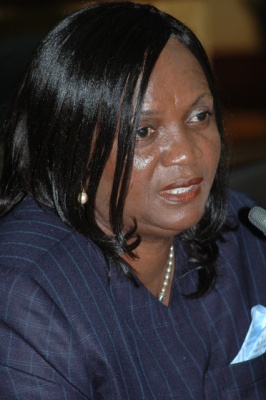
Accra, Nov. 08, GNA - The Chief Justice Mrs Justice Georgina Theodora Wood on Wednesday said the Judicial Council would use all available resources at its disposal to ensure that Judicial corruption was reduced to the barest minimum.
She said the judiciary would also draw knowledge and experiences of judiciaries worldwide and the integrity of best practices and benchmarks of other institutions to enhance its image.
Mrs Justice Wood was speaking at the launch of Ghana Integrity Initiative's (GII) report on "Corruption Monitoring Exercise in Ghana" in Accra.
The report based on administering of questionnaires to Judicial staff, judges, lawyers, litigants in Accra/Tema and Kumasi aimed at finding out to which extent judicial corruption was close to reality and find remedy to the canker.
The report concentrated on cases on land and commercial litigation. Mrs Justice Wood said corruption posed a threat to judicial legitimacy and limited their capacity to effectively fulfil their constitutional mandate.
She observed that corruption had wrecked the continent and urged all and sundry to dedicate themselves to fighting the canker. The Chief Justice said she found it a "painful duty" to address the launch of a report that indicted the judiciary and concluded that the phenomenon of judicial corruption was not a perception but real. She noted that there were many honourable men and women on the bench who had over the years served the country tirelessly and had not relented themselves to any untoward practices.
Mrs Justice Wood admitted however, that there were a few of them who had dragged the name of the judiciary in the mud but urged the hardworking ones not to "loose heart over the report which unfortunately has put everyone in one basket".
She reminded judges that high integrity was crucial to their existence and survival of constitutional democracy.
The Chief Justice told the judges that government had improved the conditions of the judiciary adding, "This gives no excuse whatsoever for any judge to misconduct himself or herself on the basis of poor conditions of service".
"I have already started enforcing rigorously the rule and these would be based purely on integrity, industry, independence and not on some other consideration such as relationship, friendship or kinship," the Chief Justice said.
She appealed to government to address the service conditions of the staff of the judicial service and said to earn promotion and appointment to the bench, integrity was going to be used as the number one criterion.
Mrs Justice Wood stressed the need to develop an effective comprehensive integrity programme and action plan and asked for cooperation from all.
She indicated further that the judiciary was into negotiations with an international institution for sponsorship and training in Judicial Integrity and Ethics for Judges and all level of staff. "Violation of and non compliance with our laws and our code of conduct would not be taken lightly, but be appropriately dealt with". To dissuade court officials and litigants who were determined from corrupting the judicial system, she said the judiciary had designed brochures and posters with clear mission and ethics based value statements aimed at discouraging the practice of bribe payment to judges and court staff.
Mrs Justice Wood entreated members of the Ghana Bar Association and the public to desist from corrupting judges and staff.
Dr Audrey Gadzekpo, GII Board Chairperson noted that issues about corruption remained controversial as most Ghanaians believed that it existed but were not certain about its dimension with regard to its prevalence in governmental institutions and agencies.
She explained that GII chose the judiciary because it was one of the most important institutions in the fight against corruption adding "the judicial power of the state remains a key resource in the development and enforcement of anti-corruption policies.
"A corrupt judiciary cannot preside over the prosecution of other corrupt public official," she said.
However, Dr Gadzekpo said to be able to hold other public officials accountable, the judiciary itself must possess the requisite moral and ethical integrity as well as financial, technical and human resources. Dr Mechthild Runger, German Technical Cooperation (GTZ) Programme Manager on Good Governance said prevention of corruption was not a matter of prosecuting individual perpetrators, as many named underlying causes were structural and institutional in nature.